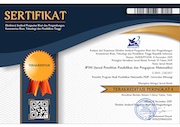Analisis adaptive reasoning proficiency mahasiswa melalui implementasi teori conditioning-reinforcement-scaffolding (CRS) pada mata kuliah analisis real
Abstract
The research approach used in this research is the quantitative approach. The quantitative study is done through experimental research method by giving treatment through CRS theory implementation in Real Analysis lecture. Provision of treatment directed to improve student’s adaptive reasoning proficiency. The research design used was quasi-experimental with the design form of matching-only pretest-posttest control group design. Population in this research is all student of semester IV of academic year 2016/2017 Program of the Mathematics Education University of Singaperbangsa Karawang who contract Real Course of Analysis, and a sample of this research involves two groups of students selected using purposive sampling technique with matching the subject. Matching the subject is done by pairing individuals based on certain criteria. These criteria are determined based on placement test results before pretesting. This is done in an effort to obtain an equivalent group. The result of the research concludes that 1) The improvement of the adaptive reasoning proficiency of students who get the learning through the implementation of CRS theory does not reach 70% of ideal criteria expected. 2) Increased adaptive reasoning proficiency of students who get learning through the implementation of CRS theory is higher than students who get learning through the implementation of constructivism theory. 3) There is an adaptive difference in reasoning proficiency of students who get learning through the implementation of CRS theory based on achievement of adaptive indicators of reasoning proficiency. 4) There is no interaction between learning factor with achievement factor of adaptive reasoning proficiency toward student’s adaptive reasoning proficiency in real analysis course.
References
Kilpatrick, J., Swafford, and B. Findel. (2001). Adding It Up: Helping Children Learn Mathematics. Washington DC: National Academi Press.
Lestari, K.E dan Yudhanegara, M.R. (2015). Penelitian Pendidikan Matematika: Panduan Praktis Menyusun Skripsi, Tesis, dan Laporan Penelitian dengan Pendekatan Kuantitatif, Kualitatif dan Kombinasi Disertai dengan Model Pembelajaran dan Kemampuan Matematis. Bandung: PT Refika Aditama.
Lestari, K.E. (2015). “Analisis Kemampuan Pembuktian Matematis Mahasiswa Menggunakan Pendekatan Induktif-Deduktif Pada Mata Kuliah Analisis Real Lanjutâ€. Jurnal Mendidik: Kajian Pendidikan dan Pengajaran Universitas Mathla’ul Anwar Banten, 1 (2), halaman 128-135.
Weber, K. (2001). “Student Difficulty in Constructing Proof: The Need for Strategic Knowledgeâ€. Educational Studies in Mathematics, 48, (1), 101-109.
Yudhanegara, M. R. (2016). “Penerapan Pembelajaran Berbasis Masalah Terbuka Terhadap Kemampuan Representasi Matematis dan Kecemasan Siswaâ€. Jurnal Mendidik, 2(2) 119-130.
Yudhanegara, M. R., dan Lestari, K. E. (2015). “Meningkatkan Kemampuan Representasi Beragam Matematis Siswa Melalui Pembelajaran Berbasis Masalah Terbukaâ€. Majalah Ilmiah Solusi, 1 (4) 94-103.
Yudhanegara, M. R, dan Lestari, K.E. (2017). “How to Develop Students’ Expereince on Mthematical Proof in Group Theory Course by Conditioning-Reinforcement-Scaffolding (CRS)â€. Proceedings: 5th South East Asia Development Research (SEA-DR) International Conference, Advances in Science, Education adn Humanities Research, volume 100, halaman 186-189.
DOI: https://doi.org/10.37058/jp3m.v3i2.257
Refbacks
- There are currently no refbacks.
©2017 JP3M (Jurnal Penelitian Pendidikan dan Pengajaran Matematika)
Program Studi Pendidikan Matematika
Fakultas Keguruan dan Ilmu PendidikanÂ
Universitas Siliwangi
Jl. Siliwangi No. 24 Kota Tasikmalaya - 46115
email: jp3m@unsil.ac.id
e-ISSN: 2581-2807 ; p-ISSN: 2460-8599

This work is licensed under a Creative Commons Attribution-NonCommercial-ShareAlike 4.0 International License.
StatCounter:
Detail


